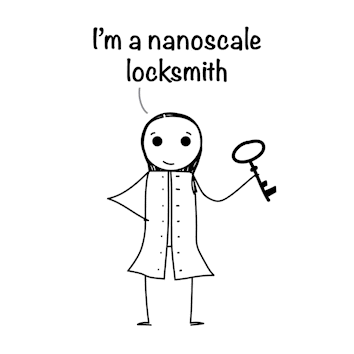The nanoscale locksmith
Hanne - head of the P2P CPP project - is not really a traditional locksmith. She's a nanoscale locksmith trying to get access to the cells, so that drugs can work their magic inside the cell. Read the full story about the P2P CPP project here.

Let’s imagine that you have a factory. And then something goes wrong!
Now you want to turn off some of your machines, and you’ll have to go push a button inside the factory. If you can do this, everything will be fine again. But what if the door is locked and you couldn’t get in?
Drugs no access
Now imagine that all of the cells in your body are like small factories. Then the doctors say that something’s gone wrong (You’ve got a disease). They have both good and bad news for you:
The good news is that they know which button to push to stop the disease. They’ve got drugs for this specific disease.
The bad news is that they can’t get inside the factory because the door is locked. That is, the drugs can’t get into the cell without help.
The key to the cell
If the factory won’t open its doors voluntarily, we’ll have to fix another way to get in. A key is a good suggestion, right?
And that’s where Hanne comes into the picture. Hanne is currently trying to find a solution for how to equip drugs with a key to the cell membrane. The key will give the drugs free access to the inside of the cell. This will in turn ensure that the drugs can go ‘push the right button’. If Hanne succeeds as a locksmith, she’s solved the problem.
Learn more
Hanne’s locksmith project is called P2P CPP. Together with her team and the industry partner STipe Therapeutics, she is working openly without patents to solve the challenge of getting drugs inside cells.
The P2P CPP project is funded by ODIN. ODIN is an #OpenInnovationInScience platform sponsored by the #NovoNordiskFoundation. If you’d like to know more about P2P CPP or ODIN, don’t hesitate to contact us. We’d love to answer your questions.
